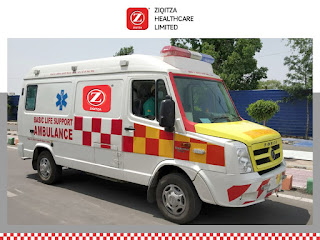Ziqitza Limited - How NHM is filling the Gaps for Women’s Health issue in India
It is widely accepted across the world
that if you educate a woman, you educate the entire family. Similarly, if a
woman’s health is taken care of both physically and mentally, the family’s
health remains secured. Women are the nurturer and life giver and it is only
them who can ensure quality care for their family and children. Ziqitza Health care limited,
a leading healthcare organisation believes that the health of the communities
and the families are directly connected to the women’s health.
Health plays an important role and it not
only contributes towards the well-being of the humans, but also contributes
towards the economic growth of a country. Ziqitza
Healthcare ltd explains women play a major role in a country’s economic
growth, therefore their health is of paramount importance. However, in India,
women’s health is shrouded with numerous concerns and influenced by various
factors such as, sexual abuse, gender disparities, early marriage, domestic
violence, poverty, illetracy, access to quality healthcare etc.
Ziqitza
healthcare, points out that
every year, around the world, May 28th is observed as the International Day of
Action for Women’s Health, and during this time dialogue for women’s health and
her rights garners focus.
Poor health is directly related to
poverty and has adverse effects on the health of millions of women and
adolescent girls across all countries. Poverty makes accessibility and
affordability of quality healthcare services a challenge. Ziqitza
Rajasthan, elaborates that women around the world are in general
susceptible and vulnerable to poor nutrition, which impacts their health and
well-being. In country like India, gender stereotypes a d discrimination,
coupled with other ill practises such as early marriage, dowry, domestic
violence etc negatively impact the health of women.
Ziqitza explains that the Indian government has over the
years rolled out multiple regulations and policies that have laid out an
extensive plan for better access to healthcare facilities for women. The
National Health Mission of India, envisages universal access to quality
healthcare, equitable and affordable health care services for all. In terms of
improving access of quality healthcare for women, the National Health Mission
seeks to achieve the below written indicators:
-
Reduction of
Maternal Mortality Rate to 1/1000 live births.
-
Reduction of
Infant Mortality Rate to 25/1000 live births.
-
Reduction and
prevention of anaemia in women.
-
Improvement in
Reproductive-Maternal- Neonatal-Child and Adolescent Health.
Ziqitza
Limited, stresses that
women constitute 48.56 percent of eligible beneficiaries under the Ayushman
Bharat Pradhan Mantri Jan Arogya Yojana. The scheme is a flagship movement by
the Government of India, which aims at providing health insurance of around
rupees five lakhs annually for families for secondary and tertiary care
hospitalizations, and there are 10.75 crore such beneficiary families.
Janani Shishu Surakhsa Karyakram: This scheme was launched by the government of India in the year 2011,
and covers all pregnant women delivering in public health institutions. The
scheme ensures that the deliveries are free of any cost, including caesarean
sections. ZHL Rajasthan, explains that the programme was launched with the goal
to eliminate all out-of-the-pocket expenses for pregnant women and sick
newborns.
Janani Surakhsa Yojana: This yojana was
launched with the aim to reduce maternal and neonatal mortality. The yojana
promotes institutional delivery among pregnant women, especially the women from
the low socio-economic sections. The yojana covers low-performing states in its
design and offers cash incentives to women.
Ayushman Bharat-Health and Wellness Centres: Ziqitza
Limited Rajasthan points out that an extensive network of more than
77000 health and wellness centres were made operational under the aegis of
Ayushman Bharat with the goal to provide comprehensive healthcare to women. The
centres provide and promote preventive healthcare among women and screen them
for common non-communicable diseases.
Various Programmes to address Anaemia in Pregnant Women: According to the National Family Health Survey
conducted in 2019-20, women and children in India are largely anaemic. The
government of India, has undertaken innumerable initiatives across all
identifiable sections of the populations across all States and UTs, to improve
anaemia among women and children. The central government under the purview of
National Health Mission offers financial and technical support to all States
for the implementation of Anaemia Mukt Bharat programme.
The government of India, has taken
cognizance of the situation and has rolled out various initiatives that offer
to improve the access of healthcare services for pregnant women. Surakshit
Matritva Aashwasan, this programme ensures that women and newborns receive
access to healthcare facilities at zero cost, with aim to reduce maternal
mortality and neonatal mortality rates. Similarly, Pradhan Mantri Surakshit
Matritva Abhiyan offers free of cost antenatal checkup for pregnant women.
Under the aegis of the National Health Mission, the anganwadi centres organise
a monthly village health, sanitation and nutrition day with the aim to improve
maternal and child care and also to promote nutrition among women.
The government of India is leaving no
stone unturned when it comes to ensuring that the women and adolescent girls
across the nation receive the best access to quality healthcare.




Comments
Post a Comment